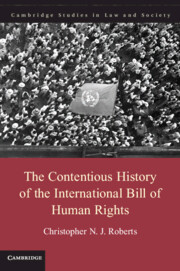Book contents
- Frontmatter
- Contents
- Preface
- Acknowledgments
- Introduction
- Chapter 1 What Are Human Rights and Where Do They Come from?
- Chapter 2 From War and Politics to Human Rights: The Cold War and Colonial Recession
- Chapter 3 Protecting State Sovereignty from the “Dangers” of Human Rights
- Chapter 4 Saving Empire: The Attempt to Create (Non)-Universal Human Rights
- Chapter 5 A Human Rights Treaty that Permits Lynching?
- Chapter 6 The United States’ Unequivocal Ambivalence toward Socioeconomic Rights
- Epilogue
- Index
- References
Chapter 1 - What Are Human Rights and Where Do They Come from?
Published online by Cambridge University Press: 05 November 2014
- Frontmatter
- Contents
- Preface
- Acknowledgments
- Introduction
- Chapter 1 What Are Human Rights and Where Do They Come from?
- Chapter 2 From War and Politics to Human Rights: The Cold War and Colonial Recession
- Chapter 3 Protecting State Sovereignty from the “Dangers” of Human Rights
- Chapter 4 Saving Empire: The Attempt to Create (Non)-Universal Human Rights
- Chapter 5 A Human Rights Treaty that Permits Lynching?
- Chapter 6 The United States’ Unequivocal Ambivalence toward Socioeconomic Rights
- Epilogue
- Index
- References
Summary
I
The United Nations flag flickered blue and white against a cloud-flecked sky between the Palais de Chaillot’s two bow-shaped colonnaded wings. The Marseillaise played in the plaza below as the French Premier welcomed the Secretary-General of the United Nations with a handshake, a smile, and a small rectangular box from which he drew an outsize golden key. He then placed the key in the Secretary-General’s hand, thereby opening up the ten or so acres of French territory in the heart of Paris to the members of the UN and formally granting extraterritorial rights to the Secretariat – the UN body responsible for the organization’s day-to-day affairs.
As the opening ceremony to the fall meetings carried on, work crews continued to prepare the interior of the Palais for the four thousand or so state representatives, advisors, experts, and journalists who in the coming days would descend on Paris for the several months of meetings ahead. The Palais had already been outfitted with new offices for the Secretariat; committee rooms for the delegations; a printing plant; as well as a telephone exchange, a radio station, and a restaurant. From its operations base at Lake Success, New York, the UN Secretariat was in the midst of transporting its bureaucratic assets across the Atlantic, which included many hundreds of staff members, 600 typewriters, its full five-language simultaneous translation apparatus, and more than 230 tons of documents. The logistical challenges associated with getting the nations of the world together for the meetings were slight, however, when measured against the obstacles that awaited within the Palais.
- Type
- Chapter
- Information
- Publisher: Cambridge University PressPrint publication year: 2014



